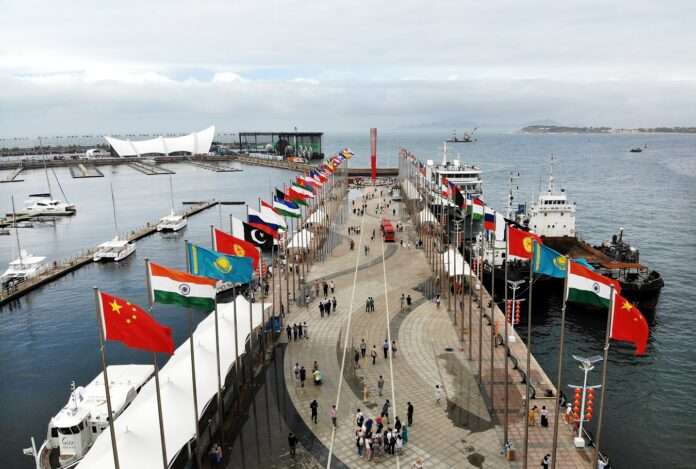On September 15, 2022, the Shanghai Cooperation Organization (SCO) held its annual summit in Samarkand, Uzbekistan. Three Arab countries – Saudi Arabia, Qatar, and Egypt – joined the summit for the first time as dialogue partners. The organization is set to expand further in 2023, with Bahrain, Kuwait, and the UAE also planning to join as dialogue partners and Iran as a full member state.
There is also talk of other countries in the region, including Israel and Iraq, joining as dialogue partners. The SCO is the largest grouping in Eurasia, covering 40 percent of the global population and virtually the same percentage of the world’s economic output. The new wave of Arab countries joining the organization reflects the strengthening economic ties between the Arab world and China and a shift in the global balance of economic and commercial power toward the East.
As a regional forum, the SCO provides a robust platform for strengthening South-South cooperation outside the leadership of the United States and European powers. The expansion of regional forums beyond a West-centric model reflects a new multi-polar reality in which countries like China are taking a growing role in leading their own economic and diplomatic groupings, with support from states in their neighborhood.
As a regional grouping, the SCO is the successor to the Shanghai Five, an organization formed in 1996 between China, Russia, and several neighboring states to deepen military trust, including by reducing armed forces in their border areas. In 2001, the grouping expanded to take its current form. While led mostly by China, it includes influential economic players like India and Russia, other key players in Central Asia, and the Caucuses like Kazakhstan, Kyrgyzstan, Pakistan, Tajikistan, and Uzbekistan.
The Free Trade Zone
The Shanghai Cooperation Organization aims to bolster economic ties between its member states. One of its priorities includes establishing a free trade zone, an accomplishment that would significantly strengthen ties. Its current economic focus encompasses energy and transportation while retaining a less pronounced security focus, mostly in anti-terrorism cooperation.
Despite some coordination in this area, the organization members repeatedly articulate that it is not a military alliance. SCO’s primary economic focus has facilitated broad accession by states often considered historic rivals. In 2017, India and Pakistan joined the grouping as members. Turkey and Armenia are also dialogue partners, reflecting the effectiveness of its declared economic focus as the primary vessel for bringing states together.
Many states involved in the SCO are also integral to the Belt and Road Initiative (BRI): China’s global infrastructure development plan to accelerate growth and cooperation by modernizing trade links. The Gulf countries are a case in point. Although not explicitly highlighted in BRI, the region’s energy resources are vital to powering China’s growth and development plans.
The Gulf supplies between half to one-third of China’s energy needs, and 60 percent of China’s trade to Europe and East Africa passes through Dubai. Between 2005-2021, the value of China’s investments and construction projects in the UAE alone reached US$ 36 billion. In 2020, China replaced the European Union as the GCC’s largest trading partner. Trade with the UAE alone grew by 30 percent in the first half of 2021.
Considering the growing importance of their economic relationship, China and the Gulf countries have acted to strengthen diplomatic ties. Since 2018, China’s President Xi has traveled to the region multiple times. China has also concluded comprehensive strategic partnerships with Saudi Arabia, the UAE, Egypt, and Morocco. President Xi also recently hosted top Gulf officials, including Saudi Arabia’s King Salman, Crown Prince Mohammed bin Salman, and UAE President Mohammed bin Zayed.
In 2022, the foreign ministers of several Gulf countries, including Saudi Arabia, Kuwait, Oman, and Bahrain, and the Secretary General of the Gulf Cooperation Council (GCC) traveled to China for an “unprecedented visit,” with Chinese media describing the visit as a positive step in strengthening their ties. While China-GCC Free Trade Agreement has made little progress since negotiations began in 2004, there is today renewed interest in reinvigorating the discussions.
Technology and Infrastructure
The Gulf states are also increasingly working with Chinese companies to develop their critical infrastructure projects and technological capabilities. At the outbreak of the Covid-19 pandemic, the UAE worked closely with Chinese companies to carry out vaccine trials and production.
Growing cooperation with China is key to the UAE’s long-term development plans and the Gulf’s efforts to expand economic relations further East: with China, India, Pakistan, and several other Asian countries. For the Gulf countries, especially the UAE, growing these trade ties is key to their plans to promote the kind of interests needed to secure a more stable long-term international framework based on values of mutual interest, cooperation, and economic stability.
Several Gulf countries’ decision to accede to the SCO is the latest step to strengthen their economic relationships. The move reflects a growing interest by the Gulf countries to build stronger economic, political, and diplomatic relationships with several global actors.
This turn to the East also reflects changes in the world’s landscape, from a unipolar to a more multi-polar world characterized by the rising influence of multiple players. In this context, building the infrastructural and institutional tools for greater cooperation – in trade and beyond – is vital for promoting stability in the new geopolitical landscape.




